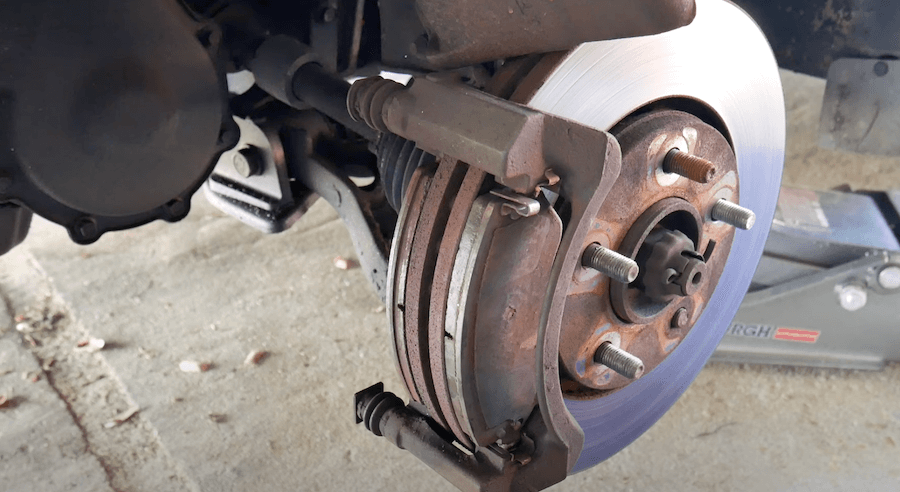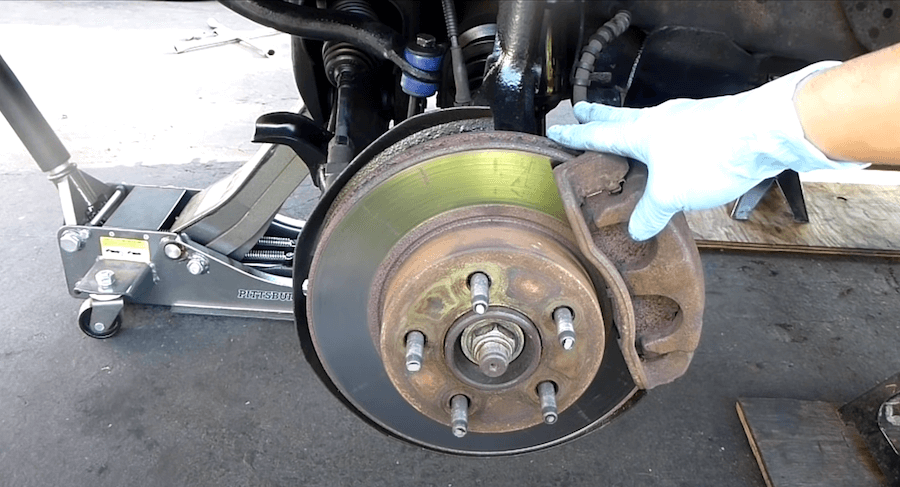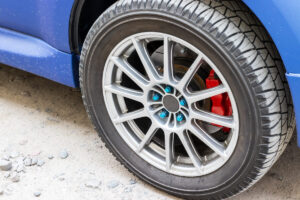Replacing brake pads is an integral piece of maintenance that’ll keep your car running smoothly, and more importantly, maximize the safety of your driving experience. Luckily, there are certain things you can look out for to know when it’s time to get them changed.
Here are a few things to look out for to help you know when to replace your brake pads:
- You brake slower with the same amount of pressure.
- There’s a squealing sound when you brake.
- You hear a grinding sound when you brake.
- The brake light turns on.
- The brake pedal vibrates.
- The brake pad is ⅛ inch (3.18 mm) thick or less.
- Your brakes ‘pull’ to one side.
- Your brakes fail in any way.
In this article, I’ll be covering everything you need to know about brake pads: how long they last, signs they need to be changed, how to check them, and more.

Signs You Need To Replace Your Brake Pads
It doesn’t take a detective or mechanic to notice the signs that your brake pads are worn out, but the indicators can be less than obvious for most people. However, with a bit of patience and practiced observation, you’ll be able to spot the symptoms of worn-out brake pads.
You Brake Slower with the Same Amount of Pressure
The first sign your brake pads are getting thin is when your car brakes more slowly.
If you have to press down further on the brake pedal to get the same effect as you used to, your brake pads might be nearing the end of their service life.
This should be quite obvious, and if you’re feeling this, it’s vital you see a mechanic as soon as possible.
There’s a Squealing Sound When You Brake
Squeaking or squealing is the first audible sign of your brakes being worn out.
While brakes can squeak during the rain, persistent squealing is a warning sign you shouldn’t ignore. To avoid damage to your brake systems, have your brakes serviced at this point.
You Hear a Grinding Sound When You Brake
If you ignore the squealing, an unpleasant grinding metal sound when you brake is what happens next, which means your brake pads are entirely gone.
Some brake pads make this noise as a warning sign, but it can also be the rotors grinding away with no brake pads present.
Immediately have your car serviced by a trusted mechanic if you hear this. If you ignore this, you risk extensive damage to your brake system and surrounding areas.
The Brake Light Turns On
Some cars, like newer Subarus and BMWs, have indicator lights that come on when your brake pads are getting too thin and trigger a certain sensor built into the braking system.
If you see this light come on, it’s best to have your brakes checked by a trusted professional for an accurate estimate on whether they need to be changed.
The Brake Pedal Vibrates
Feeling a distinct vibration when you brake isn’t normal. This vibration could be the rotor warping and unevenly wearing away your brake pads – both of these are very, very bad.
To prevent further damage to your brakes, get your car checked out right away.
The Brake Pad Is ⅛ Inch (3.18 mm) Thick or Less
If you check your brake pads yourself on a suspicion that they’re worn and find that they’re 3 mm (0.12 in) or less, it’s probably a safe bet you should just bite the bullet and get them changed.
Thinking, “Oh, I have a little time left,” and forgetting about it could cause damage you don’t want.

Your Brakes ‘Pull’ to One Side
If your brakes work better or worse on one side or feel like they’re ‘pulling’ to either side, it could be that your brake pads are being worn unevenly.
This can cause them to wear out prematurely because brake pads are designed to be worn evenly across their whole surface. So it’s worth a visit to your mechanic if this happens.
Your Brakes Fail In Any Way
When your brakes are gone, the most unfortunate thing that can happen is your brake system completely failing. This is very dangerous and can cause severe damage and/or injuries to your car and anyone in it.
Hopefully, you get your brakes checked before this happens.
Checking Your Brake Pads At Home
If you suspect your brake pads are getting thin or just want to check, there’s a simple method you can use to get an estimate of how worn they really are.
Here’s what you’ll need to check your brake pads:
- Scissors
- A straw
- Marker or pen
- Ruler
- A flashlight for best visibility
Once you have your tools, follow these steps:
- Find your brake pads; you can usually find them through the holes in your front wheels.
- Slide the straw in and alongside the pad until it stops at the base of the brake.
- Mark as close to the end as possible.
- Cut the straw at the mark.
- Measure the cut section against the ruler – if 5 mm (0.20 in) or less, consider brake pad replacement.
How Thick Should Brake Pads Be?
Brake pads are typically made of several different types of materials, including friction material, thermal insulation material (to keep them from overheating or melting), and usually a rubberized coating.
You can probably see how you’d need a minimum thickness to maintain the integrity of all of these. For example, if the thermal insulation material is worn, what’s left of the brake pad can burn and even melt.
Brake pads should be at least a quarter-inch (6.35 mm) thick to be suitable for use, but an eighth of an inch (3.18 mm) is when you should get them replaced. Brand new brake pads are typically between 10 and 12 mm (0.39 and 0.47 in) thick, and they’ll naturally wear down as you drive on them.
Some brake pads are as thin as 8 mm (0.31 in), but I wouldn’t recommend those just to be safe.
As the brake pad rubs against the wheel’s rotors to brake your car, the pad’s materials wear off – this is completely normal as long as you can notice signs the pads are wearing out.
If a mechanic saw your brake pads in that condition, they’d be begging you to have them changed. However, continuing to use brake pads past this point is unsafe and could result in damage to your car and possibly even injuries to others in the event of an accident.
How Long Do Brake Pads Last?
Brake pads have variable lifespans depending on a variety of factors. According to Firestone, manufacturers advertise numbers between 25,000 and 65,000 miles (40,233.6 and 104,607.36 km), but these are averages that might not necessarily be accurate.
Most BMW brake pads boast a lifespan of 30,000 and 70,000 miles, though that will depend on your driving habits.
How you drive your car is more important than the estimated lifespan of your brake pads. For example, if you drive a lot and tend to brake hard and suddenly, your brake pads will wear out faster.
On the other hand, if you rarely drive and gently brake, your brake pads will last longer.
There are no exact figures available, but the fact remains: treat your brakes nicely, and they’ll remain in good condition for longer than if you’re a speed demon.
How To Take Care of Brake Pads
While brake pads will always eventually wear out and need to be replaced, there are some things you can do to prolong their expected lifespans. These only require mindfulness and vigilance – no purchases necessary.
Here are a few ways you can take better care of your brake pads:
- Have your brakes and pads checked at least once a year.
- Regularly check brake fluid – alongside other fluids like oil and transmission, if possible.
- Coast on hills when possible rather than riding the brake.
- Reduce speed when following other cars to avoid potential last-second braking.
- Listen for the audible signs of worn brake pads as detailed above.
You’d be surprised at what you can hear and feel as a driver. But if you like to ride with the radio blasting, it’s worth turning the volume down every once in a while to give you a better feel for your car.
Of course, you also need to have a trusted mechanic on hand, and the most important things to expect from a good mechanic are respect and transparency. They should listen to your concerns, thoroughly check them out, and report back to you.
If you take your car in because you feel it pulling to one side, and they say there are no issues, it might be time to find someone new.
Final Thoughts
It can be scary when you suspect your brake pads are worn out, but it’s pretty easy to hear when they are.
As a driver, it’s your responsibility to listen and feel for any issues with your vehicle. Ignoring signs like squealing or when the brakes feel slower is not only going to be costly in the long run, but it’s also dangerous to other people on the road.
Luckily, with a trusted mechanic and vigilance, you can keep your brake pads in great shape and avoid unnecessary repairs.



